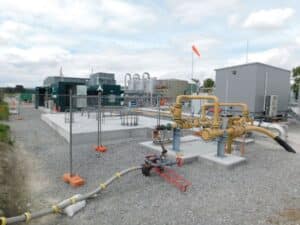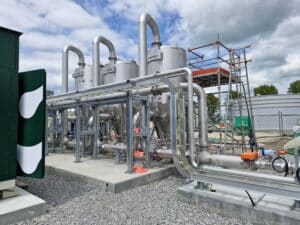New Zealand marks a milestone with first biomethane injection into gas pipeline
Last week, New Zealand marked a milestone in its energy transition pathway with the introduction of the first biomethane flows into its national gas pipeline. This underscores New Zealand’s commitment to net-zero emissions by 2050 and stick to their shorter-term emissions budgets under their NDC for 2021-2030.

Ecogas and First Renewables commissioned a biogas upgrading facility at the Ecogas Reporoa Organics Processing Facility. Biomethane produced from food waste in Broadlands is now being injected into the national grid and distributed to the market by local energy retailer Nova Energy, predominantly serving residential and commercial gas uses, potentially also serving industrial operations. BioCO2 is also produced for Ecogas as part of this new system. This will be supplied to a nearby greenhouse to enhance the growth of tomatoes in the near future.
New Zealand domestically produces 99% of its natural gas (IEA 2023). For a country where food production and export plays a major economic role, biomethane offers a unique opportunity to repurpose organic waste into clean energy. Much of the biogas produced in the country is currently not upgraded to biomethane.
WBA member Bioenergy Association of New Zealand has forecast a potential of 60 PJ of biogas production in the country, which represents about 45% of its current natural gas production. This shift could play a vital role in supporting the country’s industries that are currently dependent on natural gas, such as manufacturing and heavy transport. The Association have set their renewable gas targets in the recently published roadmap (https://www.biogas.org.nz/biogas-home).
By leading in this transition, New Zealand offers a model for the Asia-Pacific region for leveraging renewable gas as part of a holistic approach to a low-carbon energy future.

Bian Cox, Executive Officer of the Bioenergy Association of New Zealand, stated that “The blending of biomethane, produced from recycling food waste, into the national gas distribution network by Ecogas and First Renewables, opens up the opportunities for gas users to transition from fossil gases with a drop-in replacement renewable gas. Natural gas has been important for ensuring New Zealand has a reliable and efficient energy system. Now that biomethane is able to be used to supplement dwindling natural gas supplies there is a strong economic driver for increasing biomethane production.”
The World Biogas Association applauds New Zealand’s landmark achievement in introducing biomethane into its national gas pipeline. Charlotte Morton OBE, Chief Executive Officer of WBA stated that “the integration of biomethane in the national grid in New Zealand is a testament to what can be achieved through visionary partnerships, innovative technologies, and a shared commitment to sustainability. This achievement also highlights the significant social, economic and environmental opportunities for the agricultural and industrial sectors, from which New Zealand—and many other countries—can benefit tremendously by embracing renewable gas and organic residue recycling solutions.

